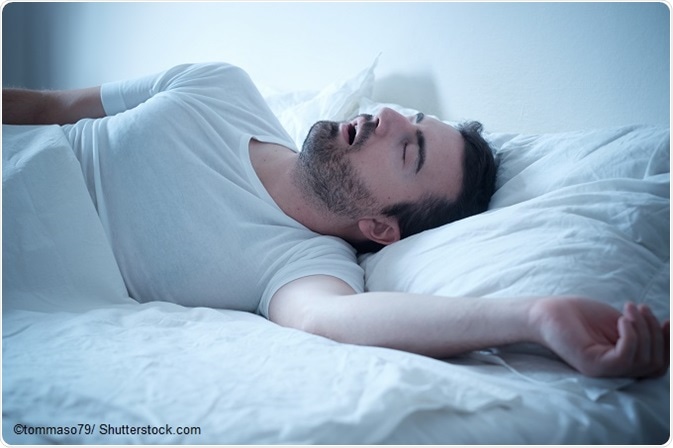Snoring is a common phenomenon, but some snorers may require medical treatment. The indications for this may include daytime fatigue, lapses into sleep during the day, and impairment of normal activity. If snoring results in morning headaches, irritability, or other symptoms, or if it disturbs the partner, it should be treated medically. In children, adenoidal or tonsillar enlargement may cause snoring, and therefore such a symptom should be reported to a physician.

Lifestyle changes
Treatment by lifestyle changes is sometimes possible. This includes weight loss, avoiding alcohol shortly before bedtime, quitting smoking, and regular exercise to make the airway and neck muscles stronger. Changing or stopping some medications may also help, but this should be done under medical supervision.
A change of sleep position is sometimes helpful, especially for those who sleep on their backs. Finally, simply wearing earplugs may help prevent friction between partners, as long as the snoring is not causing any medical problems.
Anti-snoring devices
Many devices have been developed to prevent snoring. Nasal snoring is treated with nasal strips or dilators, which prevent the nostrils from closing or narrowing during sleep.
These consist of self-adhesive tape strips or ring-shaped devices which push open the nostrils. Either may be used, as no firm evidence exists of the relative superiority of either.
Oral devices
These act somewhat similarly to nasal devices, but upon the mouth. They may consist of a self-adhesive chin strip, or a vestibular shield, a plastic device fitted inside the mouth to block air flow. This makes nose breathing mandatory, and so prevents snoring through the mouth. Again, both seem to be equally effective.
Mandibular advancement devices
The mandibular advancement device (MAD) is a shield-like device which keeps the tongue and jaw advanced in sleep. This improves the amount of airflow through the oropharynx and prevents airway narrowing. It is most useful in snoring due to the vibration of the base of the tongue.
Readymade MADs are suitable for simple snoring caused at the base of the tongue, but if snoring is caused by obstructive sleep apnea or similar breathing disorders, a custom-made MAD is far better. This should be made by an orthodontist based upon dental and jaw impressions. This will be far more expensive, which makes it less affordable for most patients. Moreover, its span of life is only about 18 months.
Surgery
There are several surgical procedures which can alleviate snoring, but this is only indicated if snoring affects one’s health or quality of life, and is not improved by other modes of treatment. Moreover, most types of snoring are not correctable by surgery.
OSA is usually treated with other therapies including CPAP (continuous positive airway pressure) which keeps the airway open during sleep using air pressure.
Surgery for snoring may be helpful when it is done to remove large tonsils or adenoids, which contribute towards airway narrowing and soft tissue vibration.
In other cases, any of four procedures may be used:
- radiofrequency ablation (RFA) of the soft palate
- palate implants
- uvulopalatoplasty (UP)
- uvulopalatopharyngoplasty (UPPP)
Uvulopalatopharyngoplasty (UPPP)
This procedure helps when soft tissue in the oropharynx or palate is the source of the sound. It involves removal of the uvula, part of the soft palate, and some of the soft tissue of the pharynx. It may include tonsil or adenoids removal. It can be very painful for up to three weeks following surgery, and leaves the patient unable to pronounce certain sounds which are not used in English but are required in some languages.
It is curative in about 50 percent of snorers who undergo it, but can cause significant or severe complications in 1 percent of patients, such as hemorrhage, pneumonia, or cardiovascular diseases.
Uvulopalatoplasty (UP)
This is often called laser-assisted uvulopalatoplasty (LAUP) and offers a lower risk than UPPP, but may also be of less use in the long term. It ablates the uvula and some of the soft palatal tissue. It is also painful.
Soft palate implants
These are used to stiffen the soft palate if its vibration is causing snoring. Its efficacy is still a matter of debate.
Radiofrequency ablation (RFA) of the soft palate
This procedure can be used in place of the above. It uses high-frequency radio waves to cause stiffening of the soft palate. It is effective in the short term but more data is required as to determine its long-term efficacy. Both these procedures are safe.
Medical treatment of snoring
This type of therapy is helpful if underlying conditions are causing snoring, such as colds and allergies. Antihistamines can help open the nasal passages and so improve the snoring. Nasal decongestants are also effective in this situation, but can cause rebound congestion if used for more than seven days, and then discontinued.
References
- http://www.nhs.uk/Conditions/Snoring/Pages/Treatment.aspx
- https://www.ncbi.nlm.nih.gov/pmc/articles/PMC539538/
- https://www.ncbi.nlm.nih.gov/pubmed/7750319
- https://www.ncbi.nlm.nih.gov/pubmed/25346027
Further Reading
Last Updated: Mar 7, 2019